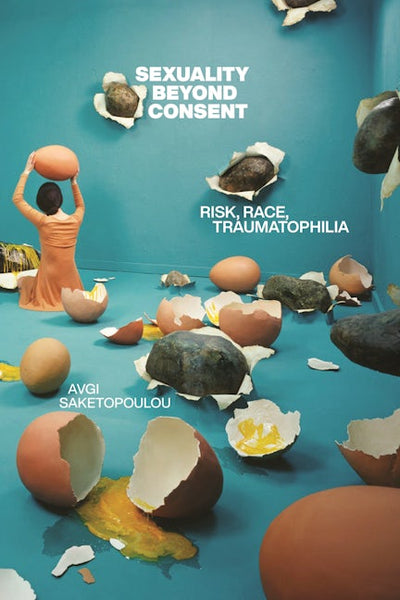You may also like
Sexuality Beyond Consent
Regular price $32.00 Save $-32.00Radical alternatives to consent and trauma
Arguing that we have become culturally obsessed with healing trauma, Sexuality Beyond Consent calls attention to what traumatized subjects do with their pain. The erotics of racism offers a paradigmatic example of how what is proximal to violation may become an unexpected site of flourishing. Central to the transformational possibilities of trauma is a queer form of consent, limit consent, that is not about guarding the self but about risking experience. Saketopoulou thereby shows why sexualities beyond consent may be worth risking-and how risk can solicit the future.
Moving between clinical and cultural case studies, Saketopoulou takes up theatrical and cinematic works such as Slave Play and The Night Porter, to chart how trauma and sexuality join forces to surge through the aesthetic domain. Putting the psychoanalytic theory of Jean Laplanche in conversation with queer of color critique, performance studies, and philosophy, Sexuality Beyond Consent proposes that enduring the strange in ourselves, not to master trauma but to rub up against it, can open us up to encounters with opacity. The book concludes by theorizing currents of sadism that, when pursued ethically, can animate unique forms of interpersonal and social care.

Deviant Matter
Regular price $30.00 Save $-30.00How deviant materials figure resistance
Yeast ferments, gelatin jiggles, drugs and alcohol froth and bubble, and flesh from animals and plants actively molds and rots. These materials morph through multiple states and phases, and their movement is imbued with a liveliness that is suggestive of volition.
Deviant Matter examines four aesthetic and material categories— gelatinousness, fermentation, putrefaction, and intoxication—to theorize how the modern state seeks to manage deviant populations across multiple scales, from the level of the single cell up to the affective and aesthetic imperatives of the state and its bureaucratic projects. Kyla Wazana Tompkins deploys a new materialist engagement with the history of race and queer life, making an argument for queer of color method as political and disciplinary critique. Deviant Matter delves into a vast archive that includes nineteenth-century medical and scientific writing; newspaper comic strips and early film; the Food and Drug Act of 1906; the literature of Martin Delany, Louisa May Alcott and Herman Melville; and twenty-first century queer minoritarian video, installation, and performance art.
Drawing from the genealogy of Black feminist and queer of color critique, in Deviant Matter rot, jelly, ferment and intoxicating materials serve as figures for thinking about how matter, art, politics, and affect can be read across multiple scales, ranging from the intimate and molecular everyday to the vast print production and inner workings of the state. Tompkins demonstrates that we are moved by our encounters with the materials in Deviant Matter, producing feelings and sensations that she links to a system of social value where these sensations come to be understood as productive, exciting, disgusting, intoxicating, or even hallucinatory. Moving through multiple states and phase changes, falling apart and reforming again, ferment, rot, intoxicants and jelly energize and choreograph both themselves and human behavior. At the same time, these materialities come to signify exactly those populations whose energy escapes the extractive efforts of capitalism and the state.

The Psychology of Tort Law
Regular price $44.00 Save $-44.00Tort law regulates most human activities: from driving a car to using consumer products to providing or receiving medical care. Injuries caused by dog bites, slips and falls, fender benders, bridge collapses, adverse reactions to a medication, bar fights, oil spills, and more all implicate the law of torts. The rules and procedures by which tort cases are resolved engage deeply-held intuitions about justice, causation, intentionality, and the obligations that we owe to one another. Tort rules and procedures also generate significant controversy—most visibly in political debates over tort reform.
The Psychology of Tort Law explores tort law through the lens of psychological science. Drawing on a wealth of psychological research and their own experiences teaching and researching tort law, Jennifer K. Robbennolt and Valerie P. Hans examine the psychological assumptions that underlie doctrinal rules. They explore how tort law influences the behavior and decision-making of potential plaintiffs and defendants, examining how doctors and patients, drivers, manufacturers and purchasers of products, property owners, and others make decisions against the backdrop of tort law. They show how the judges and jurors who decide tort claims are influenced by psychological phenomena in deciding cases. And they reveal how plaintiffs, defendants, and their attorneys resolve tort disputes in the shadow of tort law.
Robbennolt and Hans here shed fascinating light on the tort system, and on the psychological dynamics which undergird its functioning.

The Great Miscalculation
Regular price $27.95 Save $-27.95Distinguished Favorite, 2025 NYC Big Book Award: Nonfiction
How an engineering crisis threatened a career, a building, and the lives of countless New Yorkers
The Citicorp Center, a fifty-nine-story skyscraper built in 1977, immediately became one of the most recognizable features on the New York City skyline with its distinctive inclined roof and oddly placed support columns. Designed by one of the top structural engineers in the field, William LeMessurier, the tower would become the crown jewel of his professional career; In essence, he created a skyscraper on stilts. The building was a modern marvel – until it was revealed that it had a 1 in 16 chance of collapse.
The Great Miscalculation tells the riveting story of LeMessurier’s discovery of a fatal flaw in his building’s design and his decision to blow the whistle on himself, putting his reputation on the line in a race to save this iconic skyscraper. With hurricane season rapidly approaching, the structural design flaws of the Citicorp Tower posed a menacing danger. Meanwhile, the economic hardships and political turmoil of 1970s New York only compounded the obstacles to a massively expensive, never-before-seen structural redesign in the heart of downtown Manhattan.
A fascinating piece of overlooked New York City history, The Great Miscalculation tells the gripping narrative of a catastrophe averted in the nick of time.

Unsettled
Regular price $30.00 Save $-30.00Examines how young Jewish Americans’ fundamentally Jewish values have led them to organize in solidarity with Palestinians
Unsettled digs into the experiences of young Jewish Americans who engage with the Palestine solidarity movement and challenge the staunch pro-Israel stance of mainstream Jewish American institutions. The book explores how these activists address Israeli government policies of occupation and apartheid, and seek to transform American Jewish institutional support for Israel.
Author Oren Kroll-Zeldin identifies three key social movement strategies employed by these activists: targeting mainstream Jewish American institutions, participating in co-resistance efforts in Palestine/Israel, and engaging in Boycott, Divestment, and Sanctions (BDS) campaigns. He argues that these young people perceive their commitment to ending the occupation and Israeli apartheid as a Jewish value, deeply rooted in the changing dynamics of Jewish life in the twenty-first century. By associating social justice activism with Jewish traditions and values, these activists establish a connection between their Jewishness and their pursuit of justice for Palestinians.
In a time of internal Jewish tensions and uncertainty about peace prospects between Palestine and Israel, the book provides hope that the efforts of these young Jews in the United States are pushing the political pendulum in a new direction, potentially leading to a more balanced and nuanced conversation.

Crip Authorship
Regular price $37.00 Save $-37.002024 Daniel E. Griffiths Research Award Winner
2024 Outstanding Academic Title, given by Choice Reviews
An expansive volume presenting crip approaches to writing, research, and publishing.
Crip Authorship: Disability as Method is an expansive volume presenting the multidisciplinary methods brought into being by disability studies and activism. Mara Mills and Rebecca Sanchez have convened leading scholars, artists, and activists to explore the ways disability shapes authorship, transforming cultural production, aesthetics, and media.
Starting from the premise that disability is plural and authorship spans composition, affect, and publishing, this collection of thirty-five compact essays asks how knowledge about disability is produced and shared in disability studies. Disability alters, generates, and dismantles method. Crip authorship takes place within and beyond the commodity version of authorship, in books, on social media, and in creative works that will never be published.
The chapters draw on the expertise of international researchers and activists in the humanities, social sciences, education, arts, and design. Across five sections—Writing, Research, Genre/Form, Publishing, Media—contributors consider disability as method for creative work: practices of writing and other forms of composition; research methods and collaboration; crip aesthetics; media formats and hacks; and the capital, access, legal standing, and care networks required to publish. Designed to be accessible and engaging for students, Crip Authorship also provides theoretically sophisticated arguments in a condensed form that will make the text a key resource for disability studies scholars.
Essays include Mel Y Chen on the temporality of writing with chronic illness; Remi Yergeau on perseveration; La Marr Jurelle Bruce on mad Black writing; Alison Kafer on the reliance of the manifesto genre on disability; Jaipreet Virdi on public scholarship for disability justice; Ellen Samuels on the importance of disability and illness to autotheory; Xuan Thuy Nguyen on decolonial research methods for disability studies; Emily Lim Rogers on virtual ethnography; Cameron Awkward-Rich on depression and trans reading methods; Robert McRuer on crip theory in translation; Kelsie Acton on plain language writing; and Georgina Kleege on description as an access and aesthetic technique.







